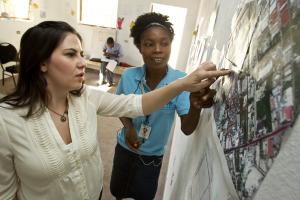Rotary Areas of Focus
The seven areas of Rotary focus that form the framework for grants.

Rotary has identified seven areas to target in order to maximize our local and global impact. At the same time, we understand that each community has its own unique needs and concerns, and these must be taken into consideration.
All projects, scholars and vocational training teams funded by Rotary’s Global Grants (not District Grants) work towards specific goals in one or more of the following areas.
The goals of Future Vision are to increase efficiency in grant processing and ensure quality of funded projects. Project planning is a bottom‐up and host club/district‐driven process, and all grant requests must comply with the policy statements related to each area of focus.
For more information on Rotary’s Areas of Focus Policy Statements click here.
Peace and Conflict Prevention/Resolution
Rotary supports the training, education, and practice of peace and conflict prevention and resolution by:
- Training leaders, including potential youth leaders, to prevent and mediate conflict.
- Supporting peace‐building in communities and regions affected by conflict.
- Supporting studies for career‐minded professionals related to peace and conflict prevention/resolution.
Disease Prevention and Treatment
Rotary supports activities and training that reduce the cause and effect of disease by:
- Improving the capacity of local health care professionals.
- Promoting disease prevention programs, with the goal of limiting the spread of communicable diseases and reducing the incidences of and complications from non‐communicable diseases.
- Enhancing the health infrastructure of local communities.
- Educating and mobilizing communities to help prevent the spread of major diseases. Preventing physical disability resulting from disease or injury.
- Supporting studies for career‐minded professionals related to disease prevention and treatment.
Water and Sanitation
Rotary supports activities and training to provide access to safe drinking water and basic sanitation by:
- Providing equitable community access to safe water, improved sanitation and hygiene.
- Strengthening the ability of communities to develop, fund and maintain sustainable water and sanitation systems.
- Supporting programs that enhance communities’ awareness of the benefits of safe water, sanitation and hygiene.
- Supporting studies for career‐minded professionals related to water and sanitation.
Maternal and Child Health
Rotary supports activities and training to improve maternal health and reduce child mortality for children under five by:
- Reducing the mortality and morbidity rate for children under the age of five. Reducing the maternal mortality and morbidity rate.
- Improving access to essential medical services, trained community health leaders and health care providers for mothers and their children.
- Supporting studies for career‐minded professionals related to maternal and child health.
Basic Education and Literacy
Rotary supports activities and training to improve education for all children and literacy for children and adults by:
- Involving the community to support programs that strengthen the capacity of communities to provide basic education and literacy to all.
- Increasing adult literacy in communities. Working to reduce gender disparity in education.
- Supporting studies for career‐minded professionals related to basic education and literacy.
Economic and Community Development
Rotary supports investments in people to create measurable and enduring economic improvement in their lives and communities by:
- Building the capacity of entrepreneurs, community leaders, local organizations, and community networks to support economic development in impoverished communities.
- Developing opportunities for productive work.
- Reducing poverty in underserved communities.
- Supporting studies for career‐minded professionals related to economic and community development.
Environment
Rotary is committed to supporting activities that strengthen the conservation and protection of natural resources, advance ecological sustainability, and foster harmony between communities and the environment by:
- Protecting and restoring land, coastal, marine, and freshwater resources.
- Enhancing the capacity of communities to support natural resource management and conservation.
- Supporting sustainable agriculture, fishing, and aquaculture practices.
- Addressing the cause of climate change by reducing the emission of greenhouse gases.
- Strengthening ecosystems and communities affected by climate change.
- Supporting education initiatives that promote behaviour that protects the environment.
- Advocating for sustainable consumption to build an economy that uses resources more efficiently.
- Addressing environmental justice issues and public health concerns.
 Contact Tony Hadfield about this page:
Contact Tony Hadfield about this page:
Related pages...

Applying for a Grant
more Many changes have been made to the process for applying for grants, and the application forms have been updated for 2025-2026

End Polio Now
more WHO South East Asia celebrates 10 years' polio free

Rotary Foundation Newsletters
more Keep up to date on the latest information

Promoting Peace
more Today, over 70 million people are displaced as a result of conflict, violence, persecution, and human rights violations. Half of them are children.

Giving to our Rotary Foundation
more Many clubs make donations to The Rotary Foundation, as do many individual Rotarians
